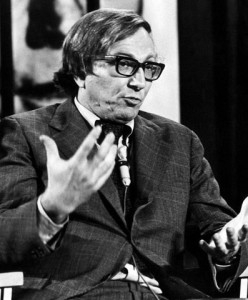With the fiftieth anniversary of the My Lai massacre, it freshly occured to me that the harrowing subject of My Lai actually also sheds some light on the reality of the decline in real journalism in the modern age.
I would assert that you can track the decline in the integrity and purpose of mainstream journalism by tracking the standing of a specific journalist named Seymour Hersh.
So, firstly, why is Hersh regarded as such an important journalist?
Well, it was a piece of investigative journalism by Hersh decades ago that exposed the war crime committed by US forces in My Lai in Vietnam. The My Lai massacre was the mass murder of unarmed Vietnamese civilians (somewhere between 347 and 504 people) by American troops in South Vietnam in 1968.
Hersh’s article caused widespread outrage around the world – and in the United States – and is credited with having played a big part in reducing public support for the war in Vietnam. The details of the crime further empowered the peace movement in the US and their demands for a US withdrawal from Vietnam (he would, much later, also publish damning pieces on the activities of US personnel at the notorious Abu Ghraib prison in Iraq).
Hersh is even credited by some with transforming the way ordinary Americans viewed war and viewed US military operations abroad.
He was awarded the Pulitzer Prize for his work, and Hersh later elaborated on his experiences in the book, My Lai 4: A Report on the Massacre and Its Aftermath. The point, in any case, is that Hersh’s article was published in mainstream media, had a massive influence on public opinion and helped to undermine any moral justification for the United States’ military activities in Vietnam.
And Hersh wasn’t then dismissed as a conspiracy theorist or a ‘foreign agent’, but was generally applauded for his journalistic undertakings.
He continued his investigative journalism in the decades that followed, covering such stories as the American military excesses in Abu Ghraib in Iraq (he in fact made it the subject of a book, Chain of Command: The Road from 9/11 to Abu Ghraib). In fact, Hersh had been a key journalist detailing the events leading in to the US-led invasion of Iraq, which he had exposed as having been in the planning since the first Gulf War and under the watch of Paul Wolfowitz, Dick Cheney and other leading Neo-Cons.
Hersh’s articles were becoming sufficiently problematic enough that Neo-Con Richard Perle labelled him the “closest thing American journalism has to a terrorist”.
In 2007, Hersh’s article ‘The Redirection’ (for The New Yorker) highlighted a shift in the Bush administration’s Iraq policy, which he showed had by now evolved to include a deliberate bolstering of extremist Sunni groups in-line with Al-Qaeda idealogy (for the purposes of a sectarian war with Iran).
In recent weeks, with the fiftieth anniversary of My Lai arriving, I’ve seen a number of news items or mainstream publications paying tribute to Hersh’s work and also reflecting on the horrific events he helped expose in My Lai.
Yet what struck me most in all of this was the extraordinary levels of hypocrisy and two-facedness in much of this retrospective praise.
After all, is the Seymour Hersh who exposed My Lai not the same Seymour Hersh who exposed the covert smuggling of weapons from Gaddafi’s fallen Libya to jihadists in Syria? Was he not the same Seymour Hersh who, on several occassions, challenged Washington’s claims about the Assad regime’s alleged use of sarin gas against civilians? The same Seymour Hersh who linked Hillary Clinton’s State Department to the smuggling of chemical weapons to Syrian rebel groups?
Yes, he is – but you wouldn’t know that from the media coverage. Because the same people who want to celebrate Hersh’s work on My Lai (and his contribution to the field of investigative journalism) are unwilling to even acknowledge – let alone discuss – the same journalist’s more contemporary pieces and assertions.
It’s either mass cognitive dissonance or its a simple desire to have one’s cake and eat it.
What’s very interesting to track – and it’s the reason I think the status of Seymour Hersh is a perfect illustration of the devaluation of journalism – is the way that Hersh has gone from being a celebrated investigative journalist to being virtually a pariah in mainstream journalistic circles.
Within the last several years, by the time Hersh’s attentions had turned towards events in Libya and Syria, there seems to have been a unanimous decision in mainstream media publications to disavow him.
When Hersh challenged Washington’s claims about the regime in Damascus having used sarin gas against civilians in 2013, no American publisher seems to have been interested in carrying his work. Hersh had to go to the London Review of Books (an excellent platform most of the time) to publish the article, ‘Who’s Sarin?‘
In the end, that’s fine. And the nature of modern online media, diversity of platforms and flow of information and linking, etc, means that the story gets around anyway; particularly when bloggers (myself included) or independent ‘citizen journalists’ link to the source-material or reference his article.
But the point is that mainstream publications, particularly in the US, wouldn’t go near the article.
The same was true of another of Hersh’s important pieces of journalism from the same time – ‘The Red Line & the Rat Line‘ – an article that was cited as a source by a number of independent writers or researchers (I also used it as a source in ‘The Libya Conspiracy‘).
In that highly important piece of investigative journalism, Hersh exposed not only the plan by Washington, Turkey, Saudi Arabia and Qatar to stage chemical attacks and blame them on Assad so that the US could attack Damascus, but also exposed the ‘Rat Line’ that Saudi Arabia, Qatar, Turkey, the CIA and MI6 used to smuggle vast amounts of weapons from Gaddafi’s military arsenals and into the hands of rebel groups in Syria.
Again, it was the London Review of Books that published the article – no American publication was willing to touch it.
In 2017, Hersh challenged another alleged chemical attack by Damascus, the one that led to President Trump’s missile strike on a Syrian air-base. In it, he explains that Trump went ahead with the strike even though his own intelligence community was unconvinced that Assad had used chemical weapons.
Again, no American publication was willing to publish Hersh’s article. This time, not even the London Review of Books was game. Instead, it was published in Germany.
Again, it still gets read by those who keep an eye out for these sorts of things; and it gets quoted or referenced (I’m pretty sure I referenced it in one of my articles). But it ultimately gets a lot less coverage or traction than it would had it been published in The New Yorker, The Washington Post, or some other big American publisher.
In a 2015 interview, Hersh touched on some of this disconnect between real journalism and mass-media propaganda or consensus reporting. “Who’s going to go into northern Syria now? And that doesn’t mean the reporting has to be as bad as it is, with so many reporters relying on phone calls from various groups tied either to Al-Nusra or the government—the propaganda war that’s going on. I wish the press sometimes wouldn’t get caught up in it.”
Now what’s fascinating to track is not merely the fact that serious investigative journalism into these matters has been sidelined in favor of corporate ‘consensus’ journalism and propaganda (or that vast swathes of the media appear to be entirely mouthpieces for government foreign-policy agendas at key points in time) – no, there’s nothing shocking about that.

But it’s the fact that even a Pulitzer-Prize-winning and previously lionised investigative journalist like Seymour Hersh was getting frozen out, unable to get his work published anymore.
The extraordinary hypocrisy of this is even more evident, as I said, when mainstream publications (including the same publications that rejected or ignored his pieces on Syria, for example) were still publishing pieces celebrating Hersh’s My Lai revelations from 50 years ago, revisiting the key role Hersh played as a dogged investigative journalist willing to expose war crimes and corrupt behaivour.
You see long pieces extolling the virtues of Hersh’s pioneering work, his dogged determination, and the shame that was brought to US military prestige or foreign-policy justifications – and yet, even as they’re revisiting what he wrote fifty years ago, none of those articles or publications will mention any of Hersh’s more recent work.
What this shows is that this kind of inconvenient investigative journalism and exposure of criminal conspiracies is only celebrated when the programmes or people it is exposing are from fifty years ago.
In other words, when the ‘shame’ is safely in the past – a blemish on previous generations – the media consensus seems to be that this is okay to draw attention to: but when the ‘shame’ is contemporary, when it involves current operations or programmes, we’d better keep quiet.
There have even been denouncements of Hersh’s work in recent years, portraying him as someone who did great work in the past and who should be celebrated for that reason, but who has subsequently lost the plot somehow or somehow become less reliable or less laudible.
Even though, in essence, what Hersh is doing now is the same as what Hersh was doing fifty years ago: helping to expose crimes or inconvenient truths about mainstream government/media narratives – it’s just not Vietnam anymore, but Iraq or Syria.
It’s almost become a cliche for people who see themselves as credible, ‘investigative journalists’ (but not really) to lionise or reference Hersh and My Lai: it’s the equivalent of people who wear Che Gueverra t-shirts.
I remember, a couple of years ago, having an argument with a journalist who had written something celebrating Seymour Hersh’s work in the 1970s. He was lionising Hersh and talking about what a milestone it was in investigative journalism and how important it had been to expose what happened in My Lai.
I complimented him on his article; and asked him (politely) whether he had read any of Hersh’s most recent articles concerning, for example, Syria.
His response baffled me at the time (and has stuck in my mind ever since). He said something like “oh, no, I don’t like his current stuff.”
I then asked why. And he said, “I don’t agree with the stuff he says nowadays”.
I could tell that he and I were on wavelengths that were too different for us to really get anywhere with an argument – so I avoided it. But I found that response very telling. He never said he thought Hersh’s assertions weren’t true – he simply said “I don’t agree” with it.
But it perfectly sums up the dynamic I’m aluding to. Specifically, that My Lai is fine and noble and all that, because it’s safely and neatly in the past. But mention Syria or sarin or something else contemporary and it becomes a no-go area.
This unspoken mentality whereby we can discuss or expose wrondgoings from the past, but not discuss wrongdoings of the present, is something I’ve noticed before: in, for example, the parliamentary and mass-media discussions recently about the Chilcot Report and the Iraq War. I remember watching a couple of hours of parliamentry discussion, where MPs lined up to denounce Tony Blair and the decision to join the Iraq invasion; and all of the media was filled with similar items of experts or journalists lamenting Tony Blair’s terrible decisions or actions.
And yet, within days of all of this apparent soul-searching and remorse, some of the same people were advocating military intervention in Syria to overthrow the Assad regime!
It was like watching a parody act – as if all of this had become a Mel Brooks movie. But, again, I’m not sure this is anything as innocent as cognitive dissonance – but more like a strategy whereby openly discussing things from years ago provides the illusion that these controversies are confronted and discussed, thus proving our openness and our willingness to confront conspiracies – when, in fact, we’re simultaneously keeping silent about the same operations and motives being involved in current events.
But this is precisely the formula: past wrongs are okay to admit to and discuss, but not contemporary wrongs. The Iraq War was, by now, long enough ago that exposure was okay. Likewise, you will sometimes find mainstream pieces acknowledging state-sponsored false-flags relating to, for example, Northern Ireland in the 70s and 80s, but not about current terror attacks involving Islamist groups.
Just as My Lai was long enough ago that Seymour Hersh’s work is openly celebrated and commemorated – whereas nothing Hersh wrote about the sarin fiasco or the ‘Rat Line’ from Libya will ever get referenced or scrutinised (until, perhaps, 15 years from now).
The fact is, however, that fifty years ago a journalist like Hersh could expose the horrific events in My Lai and still get published in a mainstream publication for maximum exposure.
And his work could then have a substantial effect on public consciousness and general perception of the war.
Today, that’s not happening – the door seems to be closed. It could be argued that the modern nature of alternative media, citizen journalism and an array of information sources (or whistleblowers) has meant that mainstream journalists simply double-down on their entrenched positions and it becomes firmly an ‘Us versus Them’ situation (literally, Respectable Journalists versus Conspiracy Theorists, Foreign Agents & Crazy Bloggers).
Certainly, there’s a sense that journalism has become very weaponised, very tribal and very agenda-oriented (both mainstream journalism and much of the alternative media) – the result, inevitably, is an absence of any real, honest investigative journalism, because all journalism simply becomes weaponised or is part of an agenda.
All of which results in a decline in or devaluation of journalism – or a loss of faith even in the idea of honest investigative journalism.
Read more: ‘Why the JFK Conspiracy Will Go On Forever‘, ‘In the Hands of Madmen: A Future Hiroshima & a Silent Media‘, ‘What If the IRAQ WAR Had Never Happened?‘, ‘The End in ALEPPO: A Confused Narrative Plays Out in Mainstream Media‘, ‘Hiroshima & the Destroyer of Worlds – Was It Justified?‘…





Fine write, although one sad reflection. The acclimatisation is underway. Accepting the bullshit at whatever scale. Sites like BBB are frontline and among Eng. speaking, and what..? How many? Far too few. Need more but have to ask? Who much cares and fed nonsense that sounds right? “Can’t-do too much harm… only words and ‘they’ll’ do what they want any…” So goes the crowds and power. Could ask, who’s causing the avalanche of counter-truthfulness? Is it the dealer or the user? Decades past there were accounts and a pressure-back from the press. Now, most docile and compliant, while curtailing online comments. Saves argument. Appreciate there’s some here and there better talk but not when it comes to, say; ‘Russia did this and…’ and ‘anti-Semitism here and…’ Intoxicating and the latest push to purge is on. The most-read of the BBB lot, beginning to suffer tech-based hack downs. While there’s a mere handful of oldies with integrity. Among the lists of lie-along-ers, their former colleagues. Those roaming about established media edges, as with Seymour. Prognosis? ‘The Western print and TV media is dishonest and corrupt beyond repair’. This from Paul Craig Roberts yesterday. How the appetite for journalism goes beyond our ‘interest’. The oppressor and cover for killing. Seems needed. ‘Syria’ a threshold breaking display. “Well someone will do it…” comes to mind and the response from today’s ‘Press’. We’ll see what the consequences are, come the lights-off/if/when — what then? Why are intelligent, sound reasonable and considerate — say UK people’s, so resistant? Will there be a shock and healthy backlash? Or, are the drugs working too effectively? Well said and your write up — not happy about but better to hear, than slumber and sick.
“I would assert that you can track the decline in the integrity and purpose of mainstream journalism by tracking the standing of a specific journalist named Seymour Hersh.”
I think that it goes back further than this in time. One aspect sometimes overlooked is the role of editors and publishers in deciding what gets published or what gets buried. The terrible crimes of the Bolsheviks in the 1920s and 1930s were largely buried in the Western press so that Westerners naively and ignorantly held to an idealistic view of communist Russia. Similarly, Allied atrocities committed during and after the war in Europe were kept hidden or downplayed. It has only been through the efforts of revisionists in recent decades that we are finally getting a more complete picture of the run up to World War II, how it was conducted, and crimes committed after 1945 by the Allies.
Whoever controls the mass media can control the public mind. Recall the Latin phrase that translates to “Who benefits?”
Yeah, fair point, larryzb. Revisionist history is a tricky area – a bit of a mine-field. Also, I think the kind of reevaluations of history that you’re talking about attract even less attention than contemporary investigative journalism.
Reblogged this on Floating-voter.
It’s to be expected when the military industrial complex rules the entire world.